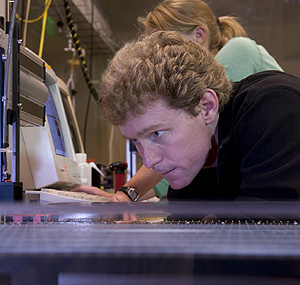UCSC alumnus Joseph DeRisi, whose breakthrough creation of a viral detection platform for malaria and other infectious diseases has helped advance biomedicine's ability to detect both existing and new viruses, has been selected to receive the 14th annual Heinz Award for Technology, the Economy and Employment, among the largest individual achievement prizes in the world.
DeRisi, 38, earned his B.A. in biochemistry and molecular biology from UCSC in 1992 and is now a Howard Hughes Medical Institute investigator and professor of biochemistry at UCSF. One of the world's foremost researchers in the application of molecular genomics to the study of infectious disease, he is among five distinguished Americans selected to receive one of the $250,000 awards, presented by the Heinz Family Foundation.
"Joe DeRisi ennobles the field of science not only by way of his pioneering advancements in the laboratory but by virtue of the altruistic and caring nature with which he carries out his work," said Teresa Heinz, chairman of the Heinz Family Foundation. "As a scientist, Dr. DeRisi has made breakthrough discoveries that have provided clarity and insight into the detection of some of the world's most threatening viruses, and his work in finding a cure for malaria offers hope to the hundreds of millions of people afflicted annually by the disease. As a humanitarian, he has distinguished himself as a generous and tireless advocate for the free and open sharing of scientific research. With a brilliant mind and expansive heart, Dr. Joseph DeRisi is a truly deserving recipient of this year's Heinz Award for Technology, the Economy and Employment."
| Related story: "Virus hunter looks to make more medical breakthroughs at UCSF," Sacramento Bee, December 7, 2008 |
DeRisi stands at the intersection of the disciplines driving the life sciences--genomics, bioinformatics, virology, materials science, and computer engineering. Together with his longtime colleague, Don Ganem, DeRisi pioneered the development and use of the ViroChip, a band-aid-sized glass wafer that contains a microarray of 22,000 DNA sequences from more than 1,300 viral families. This "diagnostics on a chip" enables scientists to not only quickly and accurately identify existing viruses, but also to detect new viruses that could emerge as pandemic threats. In 2003, the ViroChip identified the SARS virus within 24 hours of receiving the sample from the U.S. Centers for Disease Control and Prevention.
Befitting his commitment to open-access publishing within the scientific arena, DeRisi has not pursued a patent for the ViroChip, allowing researchers around the world to use the invention for free. He also has employed the ViroChip toward unlocking other discoveries, including a novel retrovirus in patients with a rare type of prostate cancer and a new subfamily of respiratory viruses. Most recently, DeRisi and his team have used the ViroChip to isolate a new virus associated with proventricular dilatation disease (PDD), a fatal disease of endangered and exotic birds.
Notwithstanding his work in virus detection, DeRisi's primary focus has been on finding a cure for malaria, a disease that infects up to 500 million people annually, killing between 700,000 and 2.7 million, mostly children. DeRisi and his team developed a malaria-specific DNA chip, similar to the ViroChip, that enabled them to characterize the parasite's distinctive 48-hour life cycle, a breakthrough that could pave the way for potential drug and vaccine therapy. As part of DeRisi's open-access approach to science and technology, the software his team developed to analyze and generate DNA chips is freely available from his web site.
As part of the California Institute for Quantitative Biosciences, a cooperative effort among three UC campuses and private industry, DeRisi's laboratory is working to apply the quantitative sciences (mathematics, physics, chemistry, and engineering) to biosciences toward improving human health. He also has taken on a number of other challenges, from investigating a cure for the common cold to an analysis of the colony collapse disorder affecting a half-million honeybee colonies in the United States, a situation that could have a viral culprit at its roots.
"Rapid advances in biotechnology and bioinformatics have enabled us to examine the nature of infectious diseases and the microbial world that surrounds us at a resolution that was once unimaginable," DeRisi said. "While I have been fortunate to participate in this field, the most exciting discoveries, diagnostic developments and, ultimately, cures are yet to come. My thanks go out to the Heinz Family Foundation for recognizing me--and by extension my many colleagues, students and post-docs over the years--with this tremendous honor."
Since 1993, the Heinz Family Foundation of Pittsburgh has recognized individuals whose dedication, skill and generosity of spirit represent the best of the human qualities that the late Senator Heinz, for whom the award is named, held so dear.
Presented in five categories, the other Heinz Award recipients are:
Arts and Humanities: Ann Hamilton, 52, visual artist and educator, from Columbus, Ohio
Environment: Thomas FitzGerald, 53, founder and director of the Kentucky Resources Council, from Louisville, Ky.
Human Condition: Brenda Krause Eheart, Ph.D., 64, founder of Generations of Hope and Hope Meadows, from Champaign, Ill.
Public Policy: Robert Greenstein, 62, founder and executive director of the Center on Budget and Policy Priorities, from Washington, D.C.
In addition to the $250,000 award for their unrestricted use, recipients are presented with a medallion inscribed with the image of Senator Heinz on one side and a rendering of a globe passing between two hands on the other. The medallion symbolizes the partnership, continuity and values carried on to the next generation. The hands also suggest passing on the stewardship of the earth to future generations.
The Heinz Awards will be presented at a private ceremony in Pittsburgh on October 21. Additional information is available online at www.heinzawards.net.



